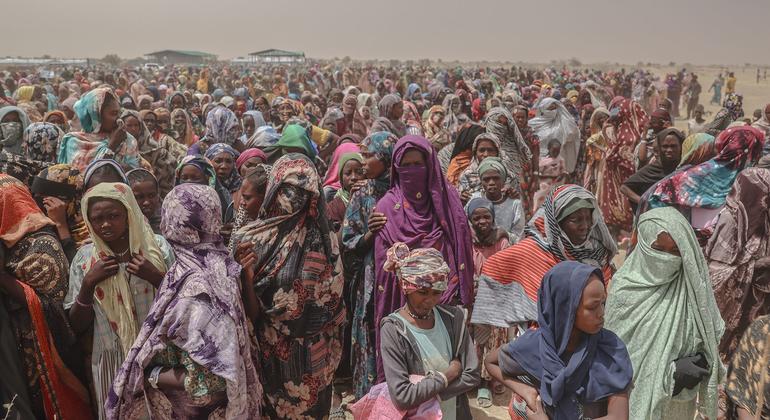“The ongoing conflict and displacement, in addition to fragile health infrastructure and limited access to affected populations, pose a risk of mass disease transmission,” the UN health agency said in a report issued Tuesday, urging immediate support to sustain surveillance, bolster outbreak response and preserve lifesaving health services.
Since civil war erupted in April 2023, 14.5 million people have been displaced – 10.5 million internally and four million to neighbouring countries such as Egypt, South Sudan, Chad, Ethiopia, Libya and the Central African Republic – making this the world’s largest displacement crisis.
Inside Sudan, conflict has devastated infrastructure and triggered the breakdown of essential services and infrastructure, fuelling the spread of cholera, measles and other communicable diseases.
At Tuesday’s press briefing in New York, UN Spokesperson Stéphane Dujarric reported that with fighting and shelling intensify across the country “the cholera outbreak in Khartoum state is worsening at an alarming rate,” with cases rising by 80 per cent over the past two weeks.
Mr. Dujarric called for “increased, flexible and timely funding to scale-up the humanitarian response, as well as unimpeded access via all necessary routes, so that aid workers can reach people in need wherever they may be.”
Disease and displacement
The impact extends well beyond Sudan’s borders. As of 7 May, Egypt has received 1.5 million Sudanese refugees during the two years of fighting.
The country has expanded healthcare coverage, but Sudanese face higher costs under the Universal Health Insurance system. WHO Egypt is working with national authorities to strengthen health services and reach the most vulnerable.
However, as Sudanese refugees arrive at overcrowded refugee camps across the region, the situation is far grimmer.
Chad. Rapid Influx of Sudanese refugees leaves thousands in desperate need
In Chad, where over 726,000 have arrived in four crisis-affected eastern provinces already overwhelmed with other refugees, health needs are urgent.
Refugees face outbreaks of malaria, measles, hepatitis E and severe acute malnutrition. There have been 657,135 cases of malaria alone and 314 deaths across the country this year.
South Sudan has received over 1.5 million people, including 352,000 Sudanese. But conflict and attacks on health facilities in the host country have severely hindered response efforts and exacerbated disease.
Hunger and cholera are especially concerning, with 7.7 million people facing severe food insecurity, and more than 54,800 cholera cases and 1,000 deaths since late September.
Ongoing WHO support
Despite the growing funding crisis and severe operational challenges, WHO and its partners continue providing support.
These include support for 136 nutrition stabilisation centres, delivery of medical supplies and consultations, cholera treatment sites, and efforts to rebuild damaged health infrastructure.
The agency has called for sustained support to prevent the worsening of what is already one of the gravest humanitarian and public health emergencies in the world today.



